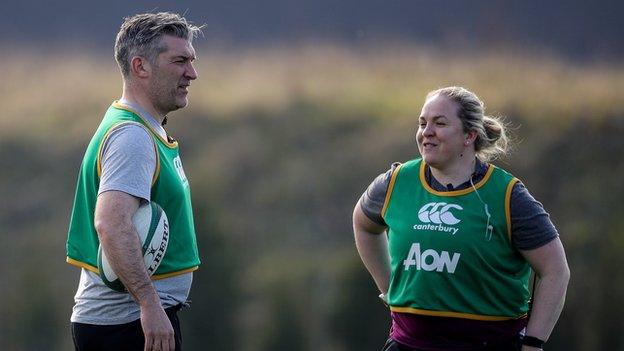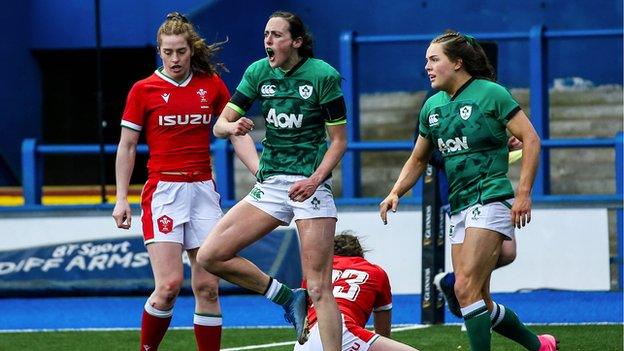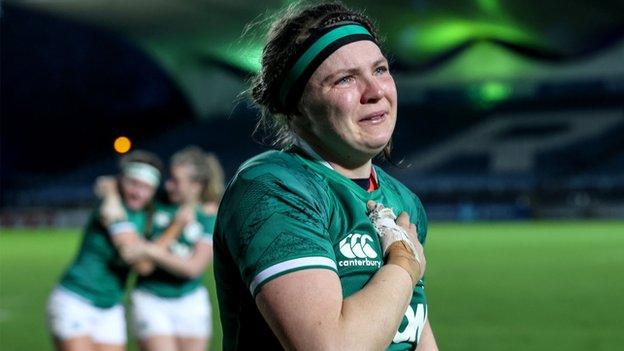Ciara Griffin column: Women's Six Nations can kickstart new era for Ireland
- Published

TikTok Women's Six Nations: Ireland v Wales |
|---|
Venue: RDS Arena, Dublin Date: Saturday, 26 March Kick-off: 16:45 GMT |
Coverage: Watch on BBC Two Northern Ireland, BBC Red Button & BBC iPlayer; listen on BBC Radio 5 Live Sports Extra, BBC Radio Wales & BBC Radio Cymru; live text commentary on the BBC Sport website & app. |
In her BBC Sport NI column, former Ireland captain Ciara Griffin explains what Greg McWilliams' side can expect from Wales in their Six Nations opener and how she is finding retired life.
This year's Six Nations is an important tournament for Ireland.
It comes at a good time after everything that's happened off the pitch over the last few months, so it's an opportunity for the group to play rugby and focus on what they're good at and love doing.
One of the important aspects for Ireland will be using this year's tournament to gain that experience of playing together and develop cohesion under new management.
But it's not going to be an overnight success. I know from personal experience that it takes time to develop a style of play with different plays and different groups.
It's important to remember this is a period of transition for Ireland.
We'll see clear progression throughout the tournament, but that doesn't necessarily always have to be points on the board or winning by a massive margin. Sometimes success can be executing a play or getting extra gainline from a set-play or winning positional battles.
Head coach Greg McWilliams has said there are a few players that could lose out on selection, and that to me shows the competition for places within the group.
He has picked his squad based on performance and is looking at the development of the group, but I was surprised to see the likes of Cliodhna Moloney, Anna Caplice and Sene Naoupu excluded.
They've been solid performers for the last number of years, but on the flip side, there are nine players there that have a chance at winning their first cap for Ireland.
That's big for them, and there are other players that have an opportunity to find their voice and develop into leaders. Greg will undoubtedly be using this 6 Nations campaign to measure his Ireland team against some of the best teams in the world and to explore new combinations in key positions.
I was never coached by Greg, but from reading, I know he's big on group cohesion and playing expansive rugby, so there will be a lot of running rugby I'd imagine.
His Ireland team will look to play quick ball. There might not be a lot of front-up challenges and they will want to move the point of contact quickly. They will aim to outwork their opposition around the park.

Greg McWilliams was assistant coach when Ireland reached the World Cup semi-finals in 2014 after a campaign that included a victory over New Zealand
Preparation is key
There's always a great buzz within the camp leading up to the start of the tournament. In the last couple of days before the game is more to do with fine-tuning than volume training.
There will be a small bit of contact to get the body ready, but after that it will be about unit work, unit splits and the decision-makers working on various different match-based scenarios.
The captain's run on Friday will be about getting used to the pitch and the group may go through what will happen in different areas, but everything is shaped around the goal of being fresh and raring to go come 16:45 GMT on Saturday.
I would always try to get as much sleep as possible if it's a later kick-off and maybe squeeze in a quick power nap, but more often than not the nerves are kicking in and there's no time.
Obviously pre-game fuelling is essential. Everyone does it differently, which I've always found fascinating. I always favoured having a big breakfast - pancakes, bacon and eggs - and a lighter pre-match meal.
It took me a while to get used to what worked for me, but that's going to be important for this group.
I was always big on visualisation, too. I'd run through things like if the referee said this, how would I react and if I saw this in front of me what would I do, what option would I take: taking it into contact, or passing it.
When you're in the heat of battle, you're expected to make decisions instantly, so it helps to keep the mind sharp. Having those cues in your head helps you when you're out on the pitch.

Ireland ran out 45-0 winners in last season's competition when the two sides met in Cardiff in April
What Ireland can expect from Wales in Dublin opener
I'm expecting a close battle on Saturday.
Wales have a really physical pack, and they have plenty of experience. They will know when to slow the game down, when to speed it up and they're clinical at set-pieces, so Ireland will be looking to attack early. It's a psychological battle so you always want to get one up on them.
Set-piece and breakdown dominance will dictate who does well. The Welsh love to attack the breakdown or slow it and set their defensive line because they like those big hits, so Ireland must look at quick ruck ball and spreading the point of contact quickly.
Wales have been professional for the last three months, and their captain Siwan Lillicrap has said they have one of the best skillsets they've ever had. Those are big words leading into a campaign and they'll be keen to back it up.
They've had a lot more time together. They had an uncapped warm-up Test against the United States, and while they ended up losing, they led 15-0 in the first 20 minutes and they will take solace that they ran a team of that quality so close.
There is no doubt they will be confident of securing a result in Dublin.

Ciara Griffin scored two tries in her final appearance for Ireland against Japan in November 2021
Life after Ireland
It's been four months since I stepped away from international rugby, but the idea of being retired didn't really hit me until the second week of January.
The group were going back into camp and that's when I realised 'oh, I'm actually not going'. It felt a bit strange, but I'm happy with where I'm at because I know it was the right decision for me.
If you try to keep everyone happy all the time, someone's going to lose and you're going to burn out. I always think of it as an egg timer, one side is full and the other's empty, and it's nice to be on the full side for a change.
I'm setting myself new challenges and it's nice being able to focus on work.
I'm training for a half-marathon in May, playing a bit of Gaelic football with Castleisland Desmonds and I'm signed up to do my Green Cert, an agricultural degree, which I've always wanted to do.
Over the last few months, I've taken time to reflect on the last six years and what I achieved and what could have been.
I don't think I'll ever fully get over the heartbreak of losing the World Cup qualifier to Scotland in Parma. Those psychological battle scars will always be with me, but I'm excited to focus on what's next for me and watch the development of this Ireland team.
Hopefully that starts with a win against the Welsh on Saturday.
Ciara was speaking to BBC Sport's Matt Gault